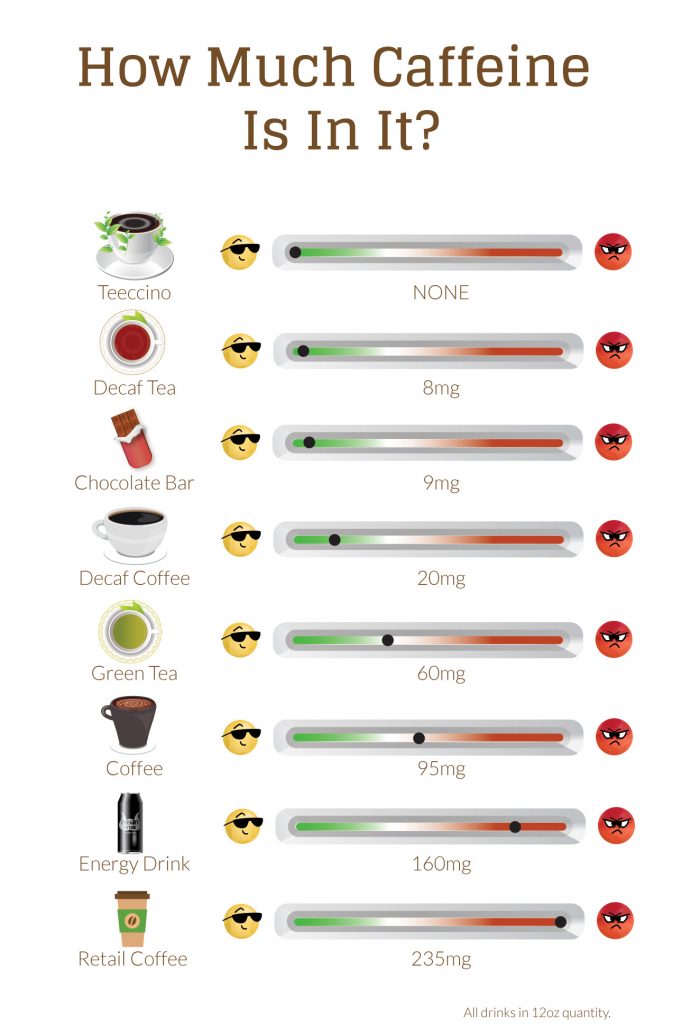There are many alternatives to coffee
While coffee is loved by many it cannot be tolerated by everyone. Some have sensitivities to the high-level of caffeine, while others can't take the acid in coffee or have found it has led to weight gain, headaches or other physical issues. You might be looking to completely cut coffee out of your life or just looking for something you can drink in the evening without laying awake all night. There are several coffee alternatives you can consider to enjoy the benefits without the drawbacks.
Decaf Coffee
While decaffeinated coffee may seem like an obvious choice for those who can't tolerate caffeine, it still contains some caffeine and this varies from different coffee brands and retail outlets. Knock back two cups of decaf coffee and you can be feeling the effects. Decaf also loses some of the natural flavor of coffee that is stripped, sometimes with rather caustic chemicals like methylene chloride, a base for paint strippers, and ethyl acetate, also known as dry cleaning fluid. People think decaffeinated coffee is healthier, but in terms of acidity, decaffeinated coffee has been shown to be more acidic than either regular coffee or caffeine alone. This is because decaffeinated coffee is made from Robusta beans which already have a higher concentration of caffeine and acid. This makes decaf not the best choice for those looking to get rid of acid and caffeine entirely.
The American Heart Association informs that decaffeinated coffee may increase bad LDL cholesterol. This can cause an increase in a type of blood fat linked to metabolic syndrome. In the study the researchers gave participants both caffeinated and decaffeinated brands and instructed them to drink only black coffee. Those using decaffeinated experienced a rise in a protein associated with bad cholesterol. Coffee drinks also contain two types of chemicals called kahweol and cafestol both of which increase cholesterol levels.
Decaf Tea
To be considered Decaf Tea 97% of the caffeine must be removed. This means that the remaining caffeine is quite low but there is still some present. Like decaf coffee removing the caffeine from tea requires the use of solvents like methylene chloride.
Teeccino
Teeccino is a coffee alternative brand from California that makes a coffee substitute with roasted organic carob, organic barley, organic chicory and organic ramon seeds. Much like coffee it's loaded with nutrients as well as inulin, a soluble fiber from chicory root that supports a healthy population of beneficial microflora necessary for good digestion. One of the nice things about Chicory root is the inulin. Further benefits are provided by two heart-healthy nutrients, potassium, an electrolyte mineral, and soluble fiber. Unlike decaf coffee there isn't any chemical processing or extraction and it's non-acidic so drinking Teeccino doesn't cause issues for those with GERD or acid reflux. Gluten free options are available.
French Chicory Root
The French Chicory Root is in many popular coffee alternatives. It's a very similar taste to coffee but smoother, with way less acid and contains no caffeine. Other benefits include a prebiotic soluble fiber that is good to promote digestion and very potent when combined with probiotics. It can be used on its own as a coffee supplement combined with coffee to reduce your daily intake.
Caffeine has been linked to many conditions including insomnia, restlessness, increased heart rate and migraines. It's generally accepted that the negative effects become more pronounced after 300-400mg. This amount can be less or more depending on your bodyweight. Some people are especially sensitive and even a tiny amount can make them feel jittery with a fast heartbeat. Due to conflicting research pregnant women have been advised by some agencies to avoid exceeding 200mg per day. Given the high levels of caffeine in drinks it can be very easy to exceed these limits, you can take the quiz below to learn how high your caffeine level is and what you can do to cut back.
Coffee & Acidity
The high acid content in coffee and particularly decaf coffee causes the lower esophageal sphincter (LES) muscles to relax allowing stomach acid to enter the esophagus. This is what causes acid reflux. Caffeine alone is a major trigger for heartburn as it also has the effect of relaxing the LES. Coffee is acidic enough that it stimulates the hypersecretion of gastric acids. Decaffeinated coffee increases acidity to an even greater degree and raises serum gastrin levels.
Caffeine Content

Ingredients
There are many common ingredients of coffee alternatives, usually best used together to get the perfect taste. The more popular include chicory, carob, barley, dandelion and ramon seeds.
Chicory root
Chicory has been popular for a long time in Europe as a substitute to coffee that tasted excellent and gave you some energy without any of the negative effects. It has also been a popular drink in New Orleans for ages. Roasted chicory root is particularly a great alternative.
Dandelion root
Roasted dandelion root has a coffee like taste without any caffeine and the added detox benefits of Dandelion. It's not nearly as bitter as regular coffee and is less acidic. Roasted dandelion root contains probiotics which are being shown everyday to be critical for just about every part of the body. More info on the benefits of Dandelion here.
Carob
These come from pods and provide some sweetness with a chocolate tone to them. Not only does Carob taste delicious it contains an ingredient called pinitol that may reduce insulin resistance and help keep blood sugar stable. Each Carob pod is loaded with flavonoids which can protect cells against free radical damage.
Ramon seeds
These are also commonly known as Maya nuts or breadnuts. Found in Central America Ramon seeds were the coffee of the Mayans and they pack a really heavy hitting nutritional profile. Very high in fiber, calcium, potassium, folic acid, iron, zinc, protein and B vitamins. Each drink is very low on the glycemic index and loaded with antioxidants.
Barley
If you go to Italy you can find a popular coffee alternative using barley. During World War II coffee was expensive so barley become a more popular coffee alternative.
Sugar
Sugar is commonly added to coffee and can increase the negative effects. When combined with coffee blood glucose rockets into the stratosphere and then crashes. This crash causes hunger, and particular craving for sugary and fatty rich foods. This cycle results in a regular imbalance of blood sugar glucose levels and fatigue, moodiness and nervousness.

